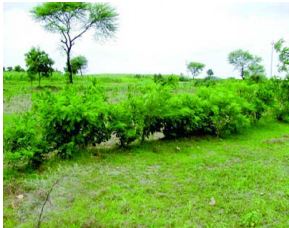Rajasthan is characterized by erratic and low rainfall with varying intensity and uneven distribution of heavy intensity rainfall in short spell. In addition, the steep slopes with sandy soils make livelihoods of small and marginal farmers from natural resources a very challenging task. A major portion of rainfall goes off as runoff, which also takes the top layer of soil away from the fields. The water tables in general are very deep and are declining further on account of overdraft. Combination of all these factors makes agriculture a very difficult proposition in the region. Hence, the central focus of this project is on works related to water and soil conservation and watershed development.
Tamil Nadu, a southern state of India, is one of the water starved states, where the per capita availability of water resources is 900 cubic meters per year as compared to all India average of 2,200 cubic meters. The annual average rainfall for the state is around 921.50 mm (48% during north-east monsoon, 35% during south-west monsoon, 14% during summer and 3% during winter). In the absence of perennial rivers, rainfall is the only source of water in the state and that too inconsistent due to vagaries of monsoon. There is an urgent need for replenishing the ground water aquifer with each and every drop of rain water to ward-off impending severe water scarcity and for sustainable development. Rain water harvesting and run-off management structures such as check dams, percolation ponds, farm ponds, Water Absorption Trenches (WATs), recharge shafts etc. are required to be constructed in order to improve the moisture regime of the watershed for increased land use).
Objectives: The overall objective of this program is to improve climate resilience and build adaptive capacities of the communities to climate change in the rain-fed areas of Tamil Nadu and Rajasthan.
Objective 1: Improving adaptation to climate variability / change in farm sector with better management and maintenance of soil and water regime enabling better crop / pasture land productivity and resultant increase in income of small and marginal farmers.
Objective 2: Promoting climate resilient farming system and diversification of livelihoods engaging community and their associations in the concrete adaptation pathway.
Objective 3: Reducing climate change vulnerability and process of marginalization with integration of risk mitigation products, like crop, weather and market advisory; and information system.
Objective 4: Creation of knowledge management system on climate change adaptation and sharing the learning to wider audience for replication and technology cascading.
Learn more
| Project Component 1: Improved soil and water regime for better crop productivity | US$ 170,585 |
| Project Component 2: Increased adaptation to climate change through climate resilient farming system approach and diversification of livelihoods | US$ 655,670 |
| Project Component 3: Integration of risk mitigation products like crop, weather and market advisory for the farmers | US$ 195,917 |
| Project Component 4: Creation of knowledge management system for climate proofing of watershed project and livelihoods | US$ 109,283 |
| Project execution cost | US$ 107,400 |
| Total Project Cost | US$ 1,238,855 |
| Implementing Entity Project Cycle Management Fee | US$ 105,300 |
| Grant Amount | US$ 1,344,155 |
Project Documents
| Attachment | Type | Size |
|---|---|---|
| Project document | 14 MB | |
| Project concept | 2 MB | |
| PPR1 (for web) | XLSX | 17 MB |
| Inception Report | 15 MB | |
| PPR2 (for web) | XLSX | 180 KB |
| Other project order | 54 KB | |
| Other project order | 55 KB | |
| Final evaluation report | 88 MB |



